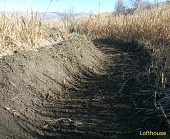




 2
2








 1
1




"You must be the change you want to see in the world." "First they ignore you, then they laugh at you, then they fight you, then you win." --Mahatma Gandhi
"Preach the Gospel always, and if necessary, use words." --Francis of Assisi.
"Family farms work when the whole family works the farm." -- Adam Klaus
 1
1




 1
1








Jay C. White Cloud wrote:Hi Scott,
I would agree 100% with what you wrote, except in highly percolating soils, then berming, swales and the related hydraulic mitigation modalities must be looked at in different ways, or even if they are going to be effective at all. In these types of soils, these techniques can still be done (if really necessary) but adjustments must be made accordingly to achieve results, often of which are not warranted for this soil type, unless there is of course erosion or other denigration of the growing sight.
Regards,
j




 1
1




Jay C. White Cloud wrote:Hi Scott,
I would agree 100% with what you wrote, except in highly percolating soils, then berming, swales and the related hydraulic mitigation modalities must be looked at in different ways, or even if they are going to be effective at all. In these types of soils, these techniques can still be done (if really necessary) but adjustments must be made accordingly to achieve results, often of which are not warranted for this soil type, unless there is of course erosion or other denigration of the growing sight.
Regards,
j
"You must be the change you want to see in the world." "First they ignore you, then they laugh at you, then they fight you, then you win." --Mahatma Gandhi
"Preach the Gospel always, and if necessary, use words." --Francis of Assisi.
"Family farms work when the whole family works the farm." -- Adam Klaus













|
I am a man of mystery. Mostly because of this tiny ad:
Justin Rhodes' Homestead Design Course - Webinar Recording (4 hours + 33 page .pdf)
https://permies.com/t/213402/Justin-Rhodes-Homestead-Design-Webinar
|



